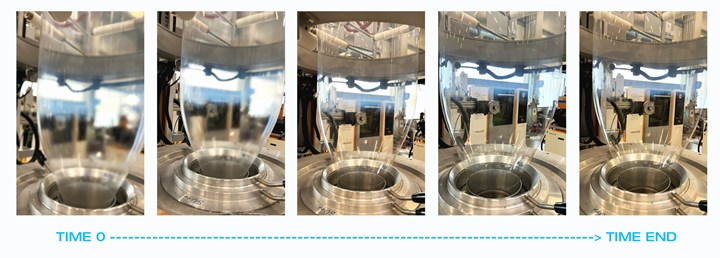PFAS-Free Process Aid Eases Switch for Extrusion Processors
Aimed at blown film, pipe, and wire and cable, two grades are reportedly compatible with other additives used in these processes.
’s Baerolub AID polymer processing aids (PPAs) is said to help extrusion processors smoothly transition from per- and polyfluoroalkyl substances (PFAS).
The new PPA targets blown film, pipe and wire & cable are free of PFAS and siloxanes, are billed as cost-competitive with existing and new PPA solutions, and are said to be compatible with other additives used in film, such as anti-block or slip agents. Baerolub AID PPAs deliver rapid melt fracture clearing for metallocene and Ziegler Natta LLDPE and HDPE, equaling or surpassing clearing times of traditional PPAs containing PFAS.
Because Baerolub AID PPAs are soluble in the polymer matrix, they provide better haze performance than insoluble PFAS-containing PPAs and excellent control of frost line height. Baerlocher USA’s new products can also reduce die build-up and extruder pressure. Because they are designed for maximum compliance with global food contact regulations, Baerolub AID PPAs are well suited for applications including PE films for food packaging and resins for potable water pipe.

Baerolub AID PPAs are soluble in the polymer matrix, so they provide better haze performance than insoluble PFAS-containing PPAs and excellent control of frost line height. Photo Credit: Baerlocher
Says Dr. Robert Sherman, technical director for Baerlocher USA, “To give our customers a choice, we developed two grades of Baerolub AID. If you’re looking for the fastest time to clear the melt fracture in metallocene LLDPE, consider Baerolub AID 2201. In certain conditions, you may wish to select Baerolub AID 2202, which provides excellent melt clearing times compared to traditional PPAs.”
Baerolub AID products are available as neat additives (pastilles, rods, granules and powders), custom blends and in masterbatch form. Baerlocher also offers customers regulatory expertise and support for lab and technical screening, blown film testing and preparation for production trials.
Related Content
-
Reduce Downtime and Scrap in the Blown Film Industry
The blown film sector now benefits from a tailored solution developed by Chem-Trend to preserve integrity of the bubble.
-
Part 2 Medical Tubing: Use Simulation to Troubleshoot, Optimize Processing & Dies
Simulation can determine whether a die has regions of low shear rate and shear stress on the metal surface where the polymer would ultimately degrade, and can help processors design dies better suited for their projects.
-
Single vs. Twin-Screw Extruders: Why Mixing is Different
There have been many attempts to provide twin-screw-like mixing in singles, but except at very limited outputs none have been adequate. The odds of future success are long due to the inherent differences in the equipment types.




